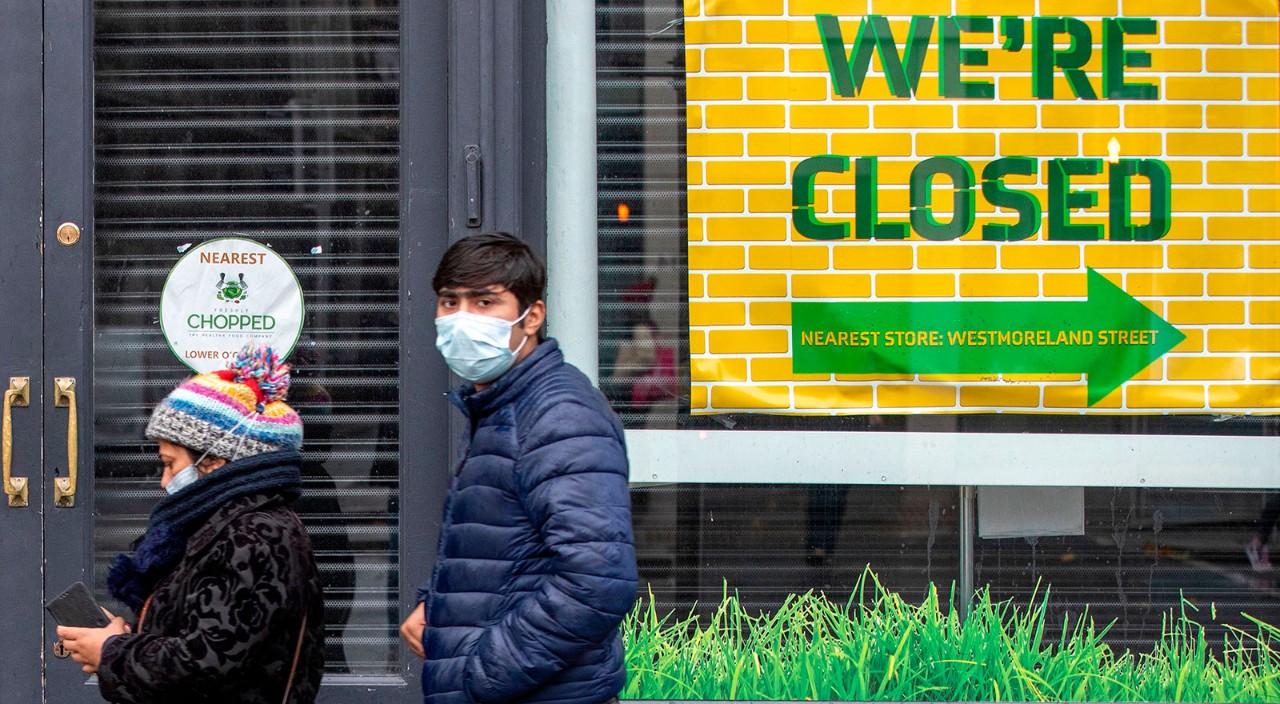
Further details of the over €17.75bn budgetary package were included in Finance Bill 2020, published on 22 October.
Covid Restrictions Support Scheme
A new Covid Restrictions Support Scheme (CRSS) will provide a cash payment to businesses forced to close or whose trade has been severely restricted due to Covid-19 public health restrictions that prohibit, or significantly restrict, customers’ access to business premises. The scheme will generally operate when Level 3 restrictions, or higher, are in place.
CRSS is available to the self-employed and to companies that are carrying on trading activities chargeable to tax under Case I of Schedule D. Their business premises must be located within a geographical region for which the Covid-19 public health restrictions are in operation.
The business must have shut temporarily or demonstrate that turnover for the period of its CRSS claim will be no more than 25% of the average weekly turnover of the business in 2019, multiplied by the number of weeks in the claim period.
Businesses that started trading in 2020 can also qualify for the scheme. Their average weekly turnover will be calculated by reference to the date the business commenced until 12 October 2020.
The support provided is an advance credit of trading expenses (ACTE) equal to 10% of the average weekly turnover up to €20,000, and 5% thereafter. The maximum weekly ACTE payment is capped at €5,000.
When a business is computing its taxable profits for 2020, the amount of deductible expenses must be reduced by the amount of the ACTE payment received.
Similar to all other pandemic-related support schemes, businesses must hold and retain tax clearance and must apply for the scheme via Revenue’s Online Service (ROS). The first payments are expected to be made in mid-November.
Revenue has released Guidelines on the Operation of the Covid Restrictions Support Scheme.
As the path and duration of the pandemic is unclear, the CRSS legislation permits variation of the scheme by Ministerial Order and its extension beyond the current end date of 31 March 2021.
Extension of debt warehousing scheme
The debt warehousing scheme for pandemic-related VAT and PAYE (Employer) liabilities is extended to include certain income tax liabilities due by the self-employed.
Payment of the balance of income tax due for the 2019 tax year and preliminary income tax for 2020 can be deferred for a year interest-free, if the self-assessed taxpayer’s total income for 2020 is less than 75% of their total income for 2019 as a consequence of the pandemic restrictions.
The scheme will be available to taxpayers who were not self-assessed taxpayers last year but who will be unable to pay their 2020 preliminary tax.
The Finance Bill also allows a taxpayer to warehouse the balance of income tax due for 2020 and preliminary tax for 2021, due for payment next year, provided that their expected total income for 2021 is less than 75% of their 2019 total income.
Taxpayers who underpaid their preliminary tax for 2019 cannot warehouse their 2019 income tax liability. However, they can opt to pay this liability on a phased basis at a reduced interest rate of 3%, provided they submit their income tax return and enter into a phased payment arrangement on ROS by 10 December 2020.
Taxpayers who qualify for these support schemes can avail of the extended 10 December 2020 ROS deadline to submit their 2019 income tax returns. Previously, this option was only available to taxpayers who could both pay and file on ROS, otherwise returns had to be filed by 31 October.
The debt warehousing scheme will now also include repayments of overpaid wage subsidies under the Temporary Wage Subsidy Scheme (TWSS). This option is available automatically to smaller businesses dealt with by Revenue’s personal or business divisions, while other businesses must contact Revenue.
Revenue is currently carrying out a reconciliation exercise to identify overpayments (and underpayments) of wage subsidies up to the end of August.
Wage support schemes
There will be no ‘cliff-edge’ to the Employment Wage Subsidy Scheme (EWSS), due to end on 31 March 2021. Finance Minister Paschal Donohoe acknowledged that a similar type of scheme will be needed until the end of 2021.
The subsidy rates paid to employers under the EWSS will be aligned with the rates of payment their employees could receive from the Department of Social Protection under the Covid-19 Pandemic Unemployment Payment (COVID-PUP).
COVID-PUP recipients will qualify for an additional week’s ‘Christmas bonus’ payment in December, provided that they have been in receipt of the payment for at least four months
Revenue announced that employers would receive EWSS subsidy payments much earlier, within days of their payroll submissions from early November (rather than after the end of the month), and has updated its guidelines on the scheme.
The COVID-PUP rates of unemployment benefit have been revised. The four rates of weekly payments will continue to depend on prior earnings, but the top weekly rate is now €350 for those who were earning a gross salary of over €400 per week.
In addition, the self-employed can now earn up to €480 per month (gross) and still retain their entitlement. COVID-PUP recipients will also qualify for an additional week’s ‘Christmas bonus’ payment in December, provided that they have been in receipt of the payment for at least four months.
The Finance Bill amended the tax legislation to ensure that the COVID-PUP is taxable under Schedule E as an emolument. Revenue announced recently that it will pre-populate details of the payments received under the COVID-PUP and the TWSS in a taxpayer’s income tax return for 2020.
In the case of PAYE taxpayers, the tax on these payments can be paid over four years from 2022, through an adjustment to tax credits.
VAT rate reduction
The 13.5% VAT rate for the tourism and hospitality sector is reduced to 9% from 1 November 2020 until 31 December 2021.




